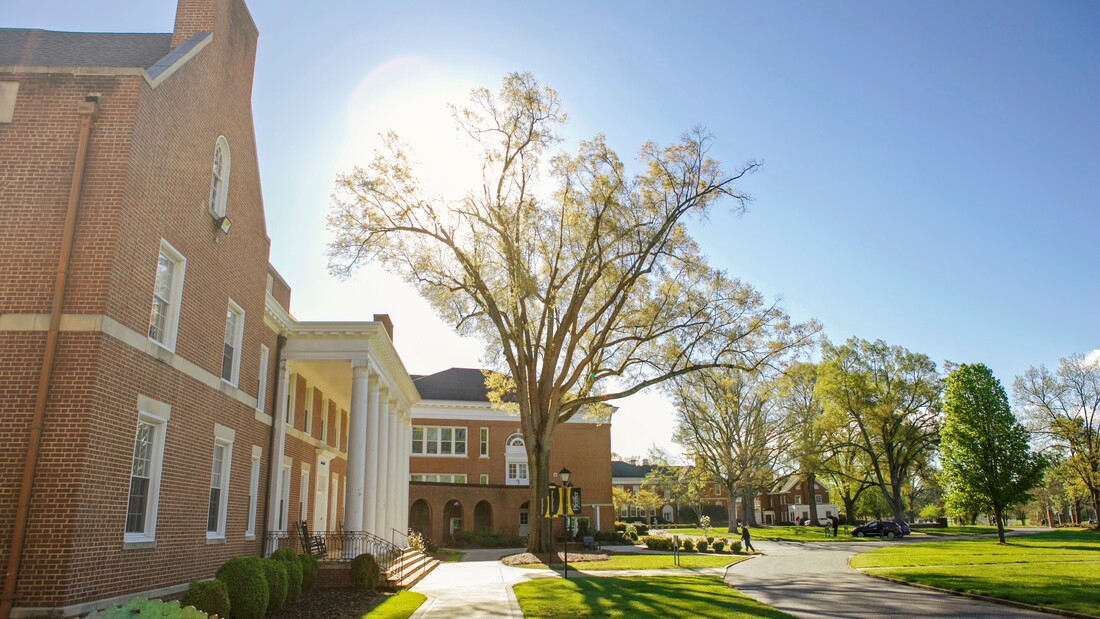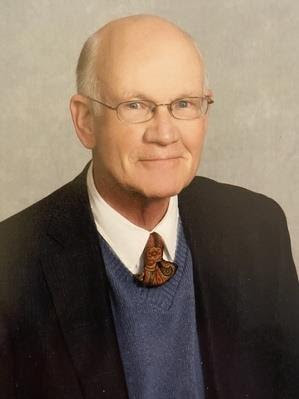|
It came in the form of a letter; I could read from the return address who it was from. But the handwriting, so distinctive, was not his, and immediately I thought, was this news sad news, maybe of his death? After all I knew he was well into his 80s. And when I opened the long envelope, there was the program for the memorial service and a short personal note from his wife, Barbara: my dear friend, former history professor, and actual first “mentor,” Eugene Earnhardt had passed away on February 4 of this year after battles with several insuperable illnesses, a few days shy of his 86th birthday. Shocked—although I suppose I shouldn’t have been—I immediately telephoned Barbara who lives in a retirement cluster near Asheville. And we had a moving, emotional conversation that lasted for about an hour. You see Gene Earnhardt was my first history professor in my freshman year for undergraduate studies at Pfeiffer University, and he was pivotal in how I would lead the rest of my life and the choices I would make. Not just that but he was an incredibly talented writer and writing stylist, for whom the written word was special: he could not abide what he called “purple prose,” pomposity, or literary laziness…or silly political correctness. I recall the first paper I wrote for him—I still have it somewhere stored away. It was a discussion of the old conservative movement of the 1950s, including writers and thinkers like Russell Kirk, Clinton Rossiter, and a few others. When I got my paper back, I got an A-, but the whole thing was marked up, bloodied in red, with comments like: “too many words to say what you mean,” “poorly phrased,” and “this paragraph should come later.” In conferences with Gene, he painstakingly gave me pointers on how better to express myself in writing, how better to make things flow and make better sense. All that was really fundamental for a young 18 year old college freshman, and I like to think that it was his dedication to his art, to teaching and instruction, that was responsible. But I know now, after fifty years of friendship after those undergrad days, that it was also because he saw something in me worth cultivating and alimenting and assisting…and because of a natural bond of friendship and respect that began back then and continued on for five more decades. But Gene was pivotal in another way, even more important and critical for me. For back in my senior year of high school I had become acquainted with the works of conservative scholar, Dr. Russell Kirk, and for Christmas 1965 I asked my parents for a selection of books by him, including his seminal, The Conservative Mind. I was enthralled and much taken by “the Sage of Mecosta” Michigan (as he was known), by his elaborate detailing and defense of a usable Anglo-American past, of our Anglo-American heritage and constitutional traditions, which he termed “conservative.” Not only that, he seemed to comprehend and express eloquently the thinking of that tradition and its major figures, beginning with Edmund Burke and continuing on through men such as John Randolph, John C. Calhoun, Benjamin Disraeli, Robert H. Taft, and T. S. Eliot, among others. So when I got to Pfeiffer and in one of my first meetings with Gene Earnhardt, I mentioned Kirk. And, amazingly, he replied: “A few years ago I sailed across the Atlantic to England, and he was on board, and we became friends.” Then, he suggested to abet my enthusiasm that I should write Kirk directly, which is exactly what I did that Fall in a long and rambling letter. I then more or less forget that…that is, until I received a response, postmarked Mecosta, Michigan, and from Dr. Kirk. I recall a phrase from that letter to this day. He wrote that Richard Nixon had requested to see him, and that “he has never listened much to what I have to say, and I doubt he will this time, either.” You can imagine my sensation. That letter began a conversation—a correspondence—that lasted almost until Russell Kirk’s death in April 1994. But not just by mail: my senior year at Pfeiffer I was in charge of the visiting speakers program (can anyone imagine that now!?), and I was able to bring him down to the college for several days, including a speech and a round-table. Later, he invited me to be his personal assistant during the year 1971-1972, opening up undreamed of opportunities and introducing me to individuals who would exercise additional and significant influence in my formation and life. After Pfeiffer I was off to the University of Virginia, awarded a Thomas Jefferson Fellowship to study under the late Jefferson biographer, Merrill Peterson. And, again, it was Gene Earnhardt who assisted me critically in preparing for that step. I took his American intellectual history course and a course in historiography, both of which were important as I went from a small college to a large university. Without his guidance, his advice, and his friendship, I doubt I would have done that or made those career changes. And after grad school our friendship continued. Occasionally, I would stop by the little town of New London where Gene and Barbara lived and spend a night and rekindle our discussions and profound friendship. Sometimes when Gene and Barbara would come to the Raleigh area to visit Gene’s brother, we would have lunch together. In every meeting, it was like old and good friends joining together once again. But I was always the student, and he always the teacher. Finally, about four or five months ago I telephoned Gene to see how he was doing. By then he and Barbara had settled into a retirement community. He had, I knew, some health issues. But I simply wanted to express to him, again, my continuous and unceasing appreciation and thanks for all he had done for me, the direction he had imparted, the patient and sage advice, and, perhaps now most of all, the deep and abiding friendship, the kind of bond and love that comes from God Himself and in which we also learn the best parts of our humanity. I tried to express this, these thoughts, to Barbara when we talked; I am not sure that I was able…words are not always easily found in these situations. But somehow I think she knows. And my dear friend and first “mentor,” Eugene Earnhardt, now at rest and at peace in the fellowship of Our Lord, knows. Old friend, teacher, exemplar, guide—thank you! Rest in peace.
2 Comments
James P. Coffin
4/20/2020 08:42:25 am
The comments about his great teacher put a lump in my throat. It reminded me of a Sunday School teacher I had as a teenager. The writers on Reckonin resonate with me. Thanks, James P. coffin
Reply
5/3/2020 06:23:14 am
I was surprised and saddened to see this piece in more than one way. Gene attended the church in which I grew up in Asheville. I remember him as warm, curious in what young people had to say, and possessing a dry but good natured sense of humor. In my twenties I was a part of a Sunday school group that met for coffee on Sundays and Gene always was an informal leader, like the professor Dr. Cathey describes. He certainly had his opinions -- I remember him commenting that W.J. Cash's The Mind of the South was "the mind of the South between Statesville and Charlotte" or something to that effect. Very sad to hear of his passing. Thank you, Dr. Cathey for illuminating his influence on you, I can say he had an effect on many.
Reply
Leave a Reply. |
AuthorBoyd D. Cathey holds a doctorate in European history from the Catholic University of Navarra, Pamplona, Spain, where he was a Richard Weaver Fellow, and an MA in intellectual history from the University of Virginia (as a Jefferson Fellow). He was assistant to conservative author and philosopher the late Russell Kirk. In more recent years he served as State Registrar of the North Carolina Division of Archives and History. He has published in French, Spanish, and English, on historical subjects as well as classical music and opera. He is active in the Sons of Confederate Veterans and various historical, archival, and genealogical organizations. Archives
May 2024
|


